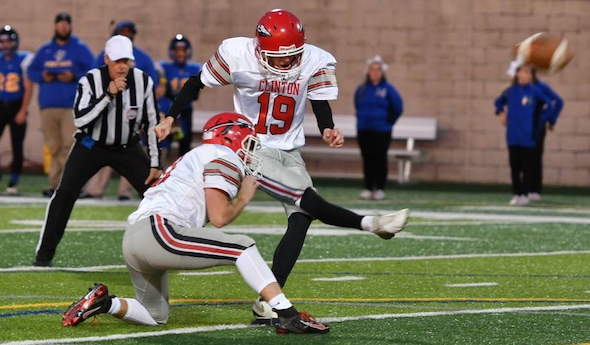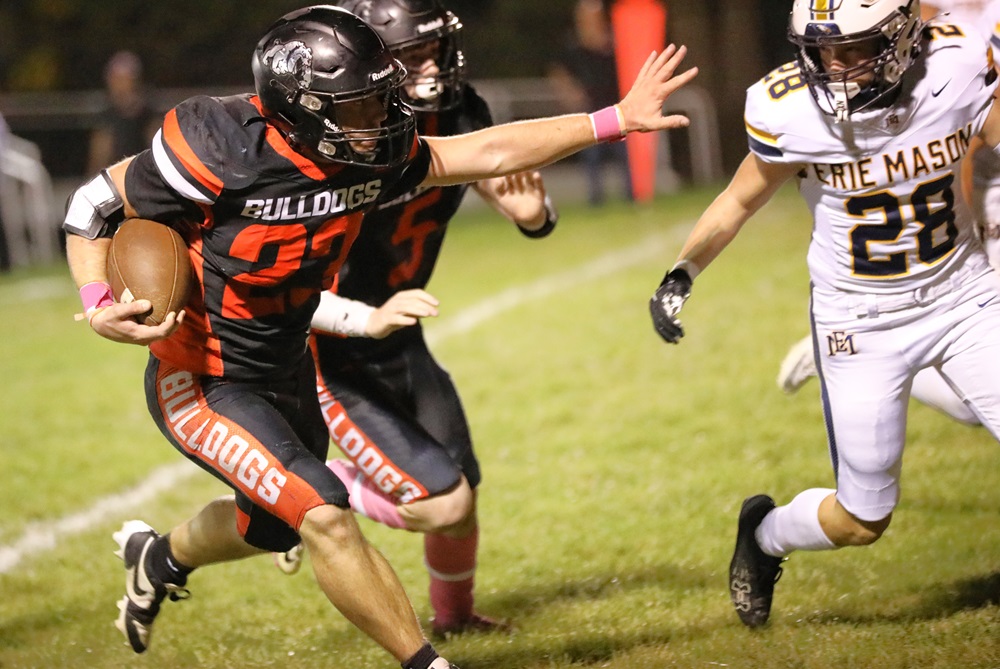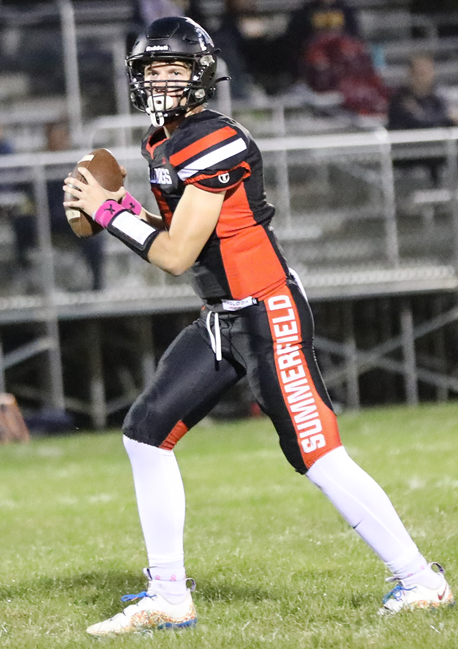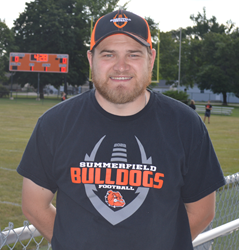
Kicker Steps Into Historic Moment
December 8, 2020
By Doug Donnelly
Special for Second Half
CLINTON – After what Jonathan Baughey has gone through, kicking a football through two yellow goal posts doesn’t seem like a very big deal.

But, when it came against an undefeated, state-ranked team on the last play of the Division 6 District championship game, it was just that.
“It was definitely a scary moment,” said Baughey, a junior from Clinton High School in Lenawee County.
Baughey’s 22-yard field goal as time expired gave Clinton a 16-13 victory over Blissfield and sent his team into a Regional Final against Warren Michigan Collegiate.
It’s been a long road for Baughey, who thought that after a successful kidney transplant in 2015 that his football career was over. At the urging of a family friend and Clinton middle school coach, however, Baughey tried kicking. It was a good choice as he’s now etched his name into Clinton football lore by making probably the biggest field goal in school history.
 “He’s been through so much, and I couldn’t be happier for him,” said Clinton football coach Jeremy Fielder. “We had a lot confidence in him kicking in that situation. There was no hesitation.”
“He’s been through so much, and I couldn’t be happier for him,” said Clinton football coach Jeremy Fielder. “We had a lot confidence in him kicking in that situation. There was no hesitation.”
Baughey was born with one kidney functioning at 25 percent and the other at 75.
“From birth he always had kidney issues,” said his mother, Kelly Baughey. “We knew growing up he would need a transplant. They tested his father and I, and we were both matches. His dad (Kevin) decided that he wanted to do it for him. He was his donor.”
Kevin Baughey never hesitated.
“It wasn’t a decision at all,” he said. “I would have given him both if I needed to.”
For years, dealing with the kidney issue was just part of Jonathan’s life. He would tire easier than other kids, but he learned to cope with it.
“I was more of a tired kid,” Baughey said. “When I was younger, it wasn’t about contact, it was about how tired I would get. I couldn’t keep up with a lot of other kids. It was hard.”
He had a kidney removed in December of 2012. After that, he said, “it was a roller coaster.” The transplant didn’t come until June of 2015, soon after he finished the sixth grade.
It took roughly six weeks in the hospital for Baughey to recover from the transplant.
“As soon as I had the transplant, I started feeling better than I had felt,” he said. “I had more energy.”
Baughey played flag football as a kid and had started playing tackle football. But when he neared the time for a transplant, he figured his football days were done. That’s when family friend and Clinton middle school coach Keith Tschirhart suggested he try kicking for the Clinton middle school team.
“I had played soccer and thought it was something I could do, so I tried it,” Baughey said. “I went out with him to the football field to see how I would do. It was pretty rough at the beginning. It took some time.”
He didn’t get much practice that first season.
“We never really kicked extra points,” he said.
Baughey kept working at it though and made it through his eighth-grade season. As a freshman he figured he would continue kicking, most likely for the Clinton JV team. He went to the tryouts.
“I kicked my first football and the coach said I was on the varsity,” he said.
Fielder said Baughey made an immediate impact.
“We didn’t have a kicker,” he said. “We had no one. I even told the coaches, ‘What are we going to do?’ Then, I saw him kick the ball and it was like, ‘He’s our kicker.’”
 It was big adjustment for Baughey. Not only had he once thought he would never play football again – but he found himself suddenly on the varsity as a freshman, not knowing anyone on the team. And, being exclusively a kicker, meant he practiced mainly by himself.
It was big adjustment for Baughey. Not only had he once thought he would never play football again – but he found himself suddenly on the varsity as a freshman, not knowing anyone on the team. And, being exclusively a kicker, meant he practiced mainly by himself.
“That was the struggle that I went through,” he said. “I didn’t know anyone. The only kids I knew were the snapper and the holder.”
Clinton grad Erik Bouse stepped in to help Baughey. Bouse had been a standout kicker for Clinton for three seasons before graduating in 2017.
“He was the one who I mainly worked with,” Baughey said. “He helped me a lot. He really started me out not creating bad habits and helped with the mental part of it.”
As a freshman, Baughey made 42 of his 50 extra-point attempts and a 21-yard field goal. As a sophomore he made 48 of 54 with a 19-yard field goal. This season he has made 29 of 37 extra-point attempts. The winning field goal against Blissfield was his only field goal of the season, on two tries.
Baughey is exclusively a kicker because of the potential risk of injury following the transplant. He wears a special pad on his stomach under his uniform because that is where doctors put his new kidney.
His mother said the no-contact rule causes some angst for her.
“He knows there is a chance he could get hit,” she said. “He wears a shield for padding. The transplant team has okayed him to play.”
Baughey practices every day, often by himself. He goes to the game field and starts at the extra point yardage and works his way back, making at least two kicks at each distance before moving on to the next level. He’ll use his cell phone to record himself, then watch the videos to make sure he is kicking correctly and not developing bad habits.
“The biggest part for me is to go out and know that I can do it,” he said. “You have to know you are going to kick it through the uprights, not just think you are going to. I like to pick out a small target, even a leaf or something, and just clear my mind and just kick the ball.”
When Clinton got the ball back with just over three minutes to go in the District Final against Blissfield, Baughey started thinking the game might come down to his foot.
“I went to the net and started kicking,” he said.
Clinton drove the ball inside the Blissfield 10-yard line, but did not reach the end zone. Fielder called a timeout on fourth down with only a few seconds left. Baughey jogged onto the field and lined up when Blissfield called a timeout.
“I remember walking to the sidelines and taking a deep breath,” he said. “People came up and talked to me and told me I could do it”
Baughey blocked everything out.
“I was really mentally focused,” he said. “After I made the kick, I started clapping. I turned around and all my teammates were jumping up and down. I ran to our coaches and everyone started hugging.”
His father, his donor, could not have been happier to see the ball go through the uprights.
“I was beside myself happy,” Kevin Baughey said. “Thinking about all of the time he spent working in the offseason, and then seeing the confidence his coaches showed with making the call to go for the field goal ... I was as proud as I could possibly be.”
 Doug Donnelly has served as a sports and news reporter and city editor over 25 years, writing for the Daily Chief-Union in Upper Sandusky, Ohio from 1992-1995, the Monroe Evening News from 1995-2012 and the Adrian Daily Telegram since 2013. He's also written a book on high school basketball in Monroe County and compiles record books for various schools in southeast Michigan. E-mail him at [email protected] with story ideas for Jackson, Washtenaw, Hillsdale, Lenawee and Monroe counties.
Doug Donnelly has served as a sports and news reporter and city editor over 25 years, writing for the Daily Chief-Union in Upper Sandusky, Ohio from 1992-1995, the Monroe Evening News from 1995-2012 and the Adrian Daily Telegram since 2013. He's also written a book on high school basketball in Monroe County and compiles record books for various schools in southeast Michigan. E-mail him at [email protected] with story ideas for Jackson, Washtenaw, Hillsdale, Lenawee and Monroe counties.
PHOTOS: (Top) Clinton's Jonathan Baughey connects on a kick. (Middle) Baughey, following through on another kick this season, clinched his team's District title with a game-winning field goal. (Photos courtesy of the Clinton football program.)

Sparked by Offense Switch, Summerfield Sets Record-Breaking Scoring Pace
By
Doug Donnelly
Special for MHSAA.com
October 29, 2024
Dylan Szegedi might only be in his second season as a head varsity football coach, but he knows when to pull the plug on an offensive scheme.
 A change from the veer to a version of the gun-T has been the catalyst behind Petersburg-Summerfield’s 8-1 season, the best at the Monroe County school in more than a decade.
A change from the veer to a version of the gun-T has been the catalyst behind Petersburg-Summerfield’s 8-1 season, the best at the Monroe County school in more than a decade.
“I really love the veer. I’ve seen it work very well,” Szegedi said. “It just didn’t work for us. We always say we were trying to put a round peg through a square hole. It just didn’t jell with our guys, and we were smart enough to realize it.”
The Bulldogs went 5-4 last season but missed the playoffs for the second straight. With several second- and third-year starting seniors back, Szegedi decided to change offenses despite having spent nearly all his years coaching the veer. He and his coaching staff started researching offenses and landed on one that is the mastermind of a coach in Alabama that puts a lot of YouTube videos together and travels around the country talking about his offensive concepts.
“This offense is perfect for our guys,” Szegedi said. “It’s a good mix of running and passing. It’s a good mix of spread but still some downhill-style run concepts. It fits our athletes to a T. It is a spread-T concept, wing-T running concepts with a spread flair to it. It was exactly what we needed.”
Heading into Friday’s home Division 8 playoff game against Manchester – the first hosted by Summerfield since 2015 – the Bulldogs are one point shy of the school record for points scored in a season. Since a 20-14 win over Ottawa Lake Whiteford in Week 5, Summerfield has scored 48, 62, 70 and 58 points in victories. The 70 points against Vanlue, Ohio, was a single-game school record.
 “It’s come together seamlessly. The proof is in the pudding. We have done great, and hopefully we will continue to do so,” Szegedi said.
“It’s come together seamlessly. The proof is in the pudding. We have done great, and hopefully we will continue to do so,” Szegedi said.
The new offense suits quarterback Trace Secor much better.
“I like this one,” Secor said. “It fits our style of play and the players we have. It complements us.”
Secor has passed for 1,248 yards and 21 touchdowns.
Senior receiver Tyler Dafoe has 743 yards and 12 touchdowns receiving. Bruising tight end Brenden Myshock has six touchdown receptions, and big-play Eli VanHuysen has caught 18 passes for 391 yards and another six touchdowns.
Senior running back Mitchell Gomulinski has had a tremendous season as well. Through nine games, he has rushed for 1,398 yards, averaging more than nine per carry. He has scored 17 touchdowns.
“Mitchell is he is our emotional leader,” Szegedi said. “He keeps everybody going and is the guy the other people look for to set the example. He’s worked very hard. I’m just proud of what he was able to do.”
The Summerfield defense has been rock-solid too. Since halftime of the Whiteford game, the Bulldogs have allowed just two touchdowns over 18 quarters. Gomulinski has 80 tackles. Dafoe and Gabe Ostrosky have five interceptions apiece.
The biggest win came against Whiteford, which played in MHSAA Finals in 2022 and 2023. It propelled the Bulldogs to the Tri-County Conference championship.
“When we beat Whiteford, that really changed the attitude of a lot of our guys,” Szegedi said. “Not that they didn’t believe before, but after that victory, I think we just started believing even more. It gave them affirmation that if we could beat them, we could hang with anybody. It gave them the belief that, ‘Hey, maybe we are pretty good.’”
The community has rallied behind the team. At a watch party Sunday when the MHSAA released the playoff pairings, about 150 parents, students and other community members met in the high school cafeteria.
 “There is talk about how they are going to decorate the town and decorate the stadium,” Szegedi said. “Last Friday the stadium was packed. That’s the way it should be.”
“There is talk about how they are going to decorate the town and decorate the stadium,” Szegedi said. “Last Friday the stadium was packed. That’s the way it should be.”
The Oregon, Ohio, native graduated from Toledo St. Francis in 2011 where he played football and was on the Knights swim team. He then continued at Wayne State University and was a two-time Division II national champion diver, earning All-America honors eight times. He was the Great Lakes Intercollegiate Athletic Conference Diver of the Year multiple times and was inducted into the Wayne State Athletic Hall of Fame.
After college he came home and decided he wanted to get into coaching football. He called his former freshman coach at St. Francis, Geoff Skibinski, and joined the coaching staff.
Since then, he and Skibinski have coached at multiple stops together. When Szegedi was hired at Summerfield in 2023, his first call was to Skibinski, who runs the Summerfield offense.
“He and I work well together,” Szegedi said. “We have a good trust in one another.”
Summerfield’s 8-1 record is the best for the school since 2010, which was also the last time the Bulldogs won a conference championship.
Szegedi is glad to see the success the 11 seniors are enjoying.
“These are guys who have played a ton of varsity football,” he said. “It’s fun to see all of the time they spent in the summer running and all of the extra lifting pay off. They are guys who deserve it. They’ve worked very hard and deserve the success they are now experiencing.”
 Doug Donnelly has served as a sports and news reporter and city editor over 25 years, writing for the Daily Chief-Union in Upper Sandusky, Ohio from 1992-1995, the Monroe Evening News from 1995-2012 and the Adrian Daily Telegram since 2013. He's also written a book on high school basketball in Monroe County and compiles record books for various schools in southeast Michigan. E-mail him at [email protected] with story ideas for Jackson, Washtenaw, Hillsdale, Lenawee and Monroe counties.
Doug Donnelly has served as a sports and news reporter and city editor over 25 years, writing for the Daily Chief-Union in Upper Sandusky, Ohio from 1992-1995, the Monroe Evening News from 1995-2012 and the Adrian Daily Telegram since 2013. He's also written a book on high school basketball in Monroe County and compiles record books for various schools in southeast Michigan. E-mail him at [email protected] with story ideas for Jackson, Washtenaw, Hillsdale, Lenawee and Monroe counties.
PHOTOS (Top) Petersburg Summerfield’s Mitchell Gomulinski (23) prepares to take on a defender from Erie Mason this season. (Middle) Bulldogs quarterback Trace Secor considers his options from the pocket. (Below) Summerfield coach Dylan Szegedi. (Action photos by Kendra Dafoe; Szegedi photo by Doug Donnelly.)

